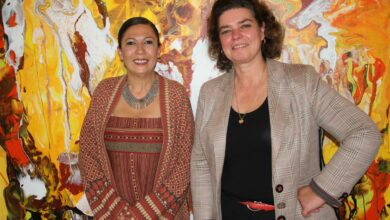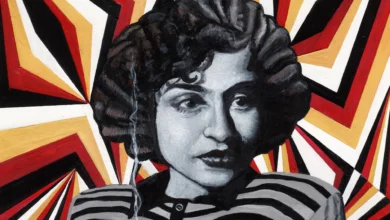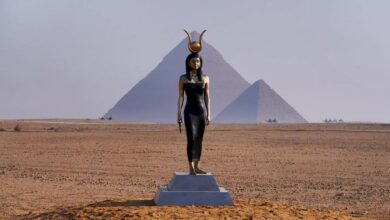Last Thursday at the Egyptian Center for Culture and Arts (Makan), Egyptian vernacular poet Zine al-Abidine Fouad, Sudanese singer Salma al-Assal, and the Egyptian-Sudanese band Nass Makan gathered to celebrate the launch of the Egyptian chapter of the Arterial Network, a program that aims to foster cultural production in Africa. The evening was organized by the Arterial Network along with the Culture Resource in Egypt–a regional organization that supports Arab arts and encourages cultural exchange across the developing world.
Since its founding in Senegal in 2007, the Arterial Network has grown to include over 130 delegates from 28 African countries, with national chapters in South Africa, Liberia, Namibia, Cameroon, Swaziland, Togo and Zimbabwe. Egypt is the latest African country to join the network, and its membership –the first stages of which were being celebrated at Makan– signals a growing attempt to address national limitations in arts education and funding. 100 creative workers active on the Egyptian cultural scene were invited on Thursday to join the network and elect 7 members for the steering committee that will manage the Arterial Network activities in Egypt.
Funding of the African art scene is a continent-wide issue. Despite the large number of artists, the continent contributed less that 1% of the world’s trade in creative goods and industries in 2007. Governments are pressured to ignore the arts in order to fund sectors that seem more pressing or economically viable. Arterial recognizes the richness of African cultural life and sees great potential in the creative industries to contribute to economic growth and social development. By engaging cultural practitioners and NGOs across the continent, Arterial hopes to develop new strategies for networking, capacity building and funding. Basma al-Husseiny, the director of the Culture Resource in Egypt explained in her opening speech on Thursday that developing countries, because they face similar challenges, have a better chance of finding viable solutions through a network like Arterial.
So far, Arterial has organized a number of training workshops in arts management and cultural journalism. It is developing educational toolkits and in the long run hopes to strengthen local cultural institutions for a sustainable result. With most funding options in the region being limited to foreign donors –and thus the artists being pressured to respond to donors’ interests– Arterial focuses on the creation of independent funds for African cultural projects.
But whatever the intentions of the Network, African artists still struggle with certain restrictive categorizations based on ethnic identifications on the global arts scene. Creative workers are often seen as ambassadors of their cultures rather than real participants on the international scenes of visual arts, dance, theatre and music. This has sometimes discouraged artists from engaging with institutions and networks that promote arts in regional terms.
Arterial Network, nevertheless, seems to acknowledge these issues. In May 2009, it launched the Arts in Africa website, a directory of arts events in the continent. The website seeks to publicize events and festivals without suggesting a framework of representation. Arterial’s plans for organizing visual arts, music, theatre and dance biennials as well as its work on capacity building and developing funding alternatives is meant to encourage the creation of regional and international markets for African arts and empower creative workers to take their arts in any direction they wish.
Whatever the risks of misinterpretation, the benefits of regional networks cannot be overlooked in terms of providing infrastructure and increasing the visibility of arts from Africa globally. The eagerness of African artists to network among one another was evident last Thursday. Attendees of the party at Makan started planning joint projects of common interest, and listened raptly to Al-Abidine’s reading of a famous Zulu poem delivered during the celebrations of South African leader, Nelson Mandela’s presidency in 1994; “Remember, O leader … that for every bread crumb you were fed in prison, millions starved.” The poem –one of many translated by al-Abidine in his book Poetry from Other River Banks: Translated African Poems– was written to remind Mandela that his democratic accession to power was made possible by the many sacrifices of the South African people.
Arterial’s mission is perhaps best highlighted by South African painter and writer Breyten Breytenbach in his key note speech at the Arterial Conference: Vitalizing African Cultural Assets at Goree Island, Senegal in March 2007:
Often there is a willful misreading of the reality we live in – for racist or paternalistic purposes to justify the fact that Africa is in effect left to wallow in non-development, or else to see it as an exotic and slightly dangerous object of folkloristic pity mixed with excitement; or again, the misreading may be self-serving because we Africans wish to continue portraying ourselves as victims of history.




